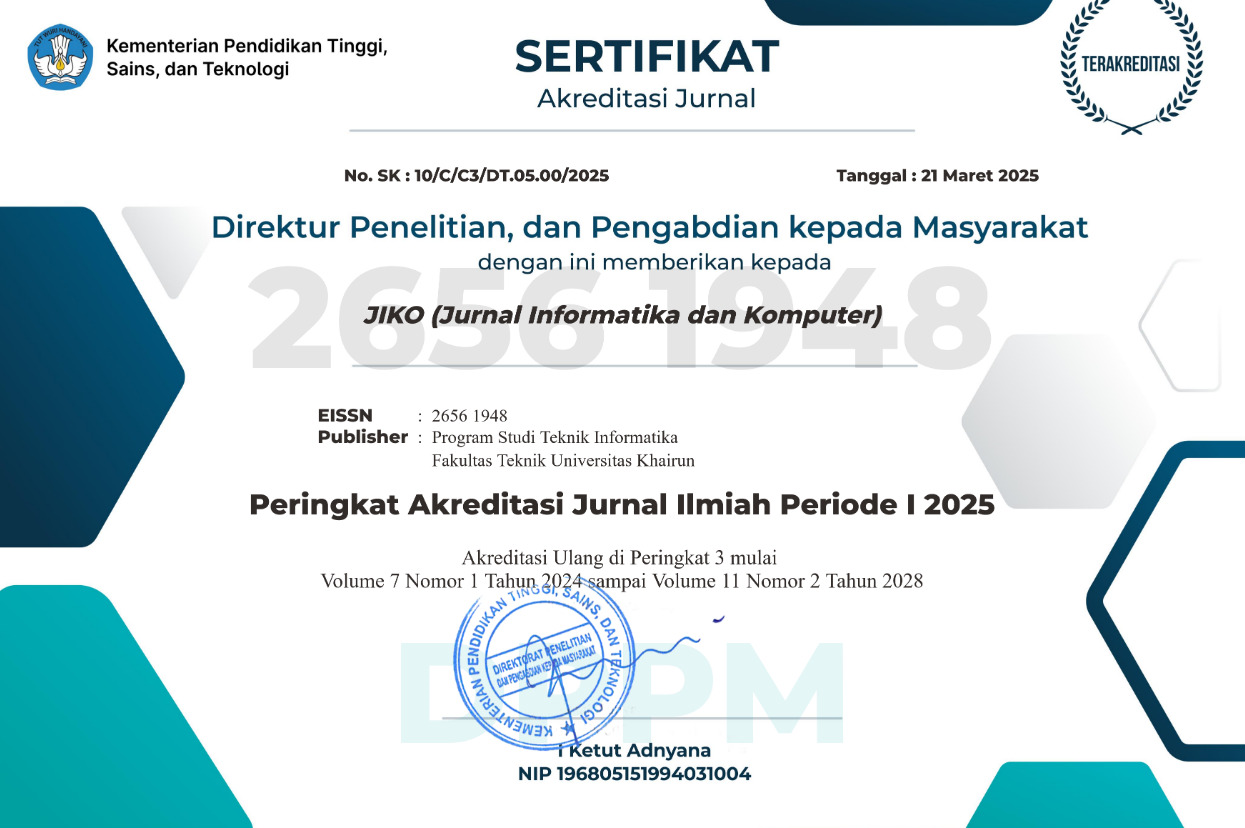COMBINATION OF MULTI-VIEW LEARNING AND DEEP REINFORCEMENT LEARNING TO IMPROVE WEBSITE PHISING DETECTION
Abstract
Full Text:
PDFReferences
A. P. Working Group, "Phishing Activity Trends Report," 2023. [Online]. Available: https://apwg.org/trendsreports/
M. S. F. Purwani, "Analisis peran dan penanggulangan kejahatan siber: Studi kasus spearphishing," Restor. J. Indones. Probat. Parol. Syst., vol. 1, no. 1, pp. 33–45, 2023, doi: 10.59653/restor.v1i1.56.
I. H. R. Hatta et al., Kecerdasan Buatan. Cendikia Mulia Mandiri, 2024.
C. Xu, J. Si, Z. Guan, W. Zhao, Y. Wu, and X. Gao, “Reliable Conflictive Multi-View Learning,” Proc. AAAI Conf. Artif. Intell., vol. 38, no. 14, pp. 16129–16137, 2024, doi: 10.1609/aaai.v38i14.29546.
Y. Wang, W. Ma, H. Xu, Y. Liu, and P. Yin, "A lightweight multi-view learning approach for phishing attack detection using transformer with mixture of experts," Appl. Sci., vol. 13, no. 13, p. 7429, 2023, doi: 10.3390/app13137429.
M. R. Ridho, N. Fajrah, and F. Fifi, "Literatur review: Penerapan deep reinforcement learning dalam business intelligence," J. Desain Dan Anal. Teknol., vol. 3, no. 2, pp. 96–103, 2024, doi: 10.58291/jdat.v3i2.379.
M. A. G. Al Ghifari, B. Hananto, and B. T. Wahyono, "Implementasi ekstensi Google Chrome dalam mendeteksi situs web phishing menggunakan algoritma Random Forest," in Proc. Semnas Mahasiswa Bidang Ilmu Komputer dan Aplikasinya, 2022, pp. 640–649.
R. Rahmadani, A. Rahim, and R. Rudiman, “Analisis Sentimen Ulasan ‘Ojol The Game’ Di Google Play Store Menggunakan Algoritma Naive Bayes Dan Model Ekstraksi Fitur Tf-Idf Untuk Meningkatkan Kualitas Game,” J. Inform. dan Tek. Elektro Terap., vol. 12, no. 3, 2024.
E. N. Yudistira and S. Kom, Deep Learning: Teori, Contoh Perhitungan, dan Implementasi. Deepublish, 2024.
R. Y. Putra and F. T. E. D. I. Cerdas, “Perencanaan Gerakan pada Mobil Otonom di Jalan Raya Menggunakan Quantile Regression Deep Q Network,” Institut Teknologi Sepuluh Nopember, 2021.
Z. A. Dwiyanti and C. Prianto, "Prediksi cuaca kota Jakarta menggunakan metode Random Forest," J. Tekno Insentif, vol. 17, no. 2, pp. 127–137, 2023, doi: 10.36787/jti.v17i2.1201.
R. Fauzan, A. V. Vitianingsih, D. Cahyono, A. L. Maukar, and Y. A. B. Suprio, "Penerapan algoritma klasifikasi pada machine learning untuk deteksi phishing: Application of classification algorithms in machine learning for phishing detection," MALCOM Indonesia. J. Mach. Learn. Comput. Sci., vol. 5, no. 2, pp. 531–540, 2025, doi: 10.33050/malcom.v5i2.4126.
T. Tukino and F. Fifi, "Penerapan Support Vector Machine untuk analisis sentimen pada layanan ojek online,"J. Desain Dan Anal. Teknol., vol. 3, no.2, pp. 104–113, 2024, doi: 10.58291/jdat.v3i2.380.
W. S. Lestari, "Deteksi serangan DDoS menggunakan Q-learning," JATISI J. Tek. Inform. dan Sist. Informasi, vol. 9, no. 1, pp. 648–658, 2022, doi: 10.35957/jatisi.v9i1.772..
D. A. S. Pratama, "Pengembangan kontrol adaptif untuk kendaraan otonom dengan studi kasus pada mobil elektrik berbasis deep reinforcement learning," M.S. thesis, Dept. Electrical Eng., Institut Teknologi Sepuluh Nopember, Surabaya, Indonesia, 2024.
R. Firmansyah and A. Setiawan, "Hybrid deep learning untuk deteksi phishing URL," JIKO J. Inform. Dan Komput., vol. 5, no. 2, pp. 122–131, 2023, doi: 10.33387/jiko.v5i2.6724.
DOI: https://doi.org/10.33387/jiko.v8i2.9811
Refbacks
- There are currently no refbacks.











